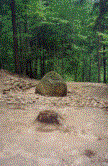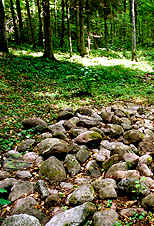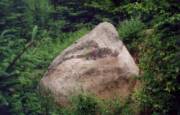 |
RELIGION AND DEMOCRACY: AN EXCHANGE OF EXPERIENCES BETWEEN EAST AND WESTTHE CESNUR 2003 INTERNATIONAL CONFERENCE |
Maybe Shambhala is here: Esoteric Quests in Latvia Today
by Solveiga Krumina-Konkova, doctor of philosophy, leading researcher
at the Institute of Philosophy and Sociology, University of Latvia.
A paper presented at the CESNUR 2003 Conference, Vilnius, Lithuania. Preliminary version. Do not reproduce or quote without the consent of the author.
In my paper I will deal with esoteric ideas which are interesting for individuals and several esoteric-oriented groups in Latvia now. However, I will begin my turn with apology for my research is still in a progress. So I can present you only some interim report that will outline the main field of my key interests above all.
During my research I have established that there are only a few organised esoteric groups in Latvia, in contrast with Western countries. Some of them have been registered as cultural organisations and their popularity is insignificant, at least on the surface. Nevertheless, if we observe these organisations carefully, we can see two features that are essential for the current esoteric tradition in Latvia.
Firstly, all these organisations shape around some single individuals as the separate groups of their like-minded fellows or supporters. So we could define these organisations as more or less private circles that have gained certain official status.
Secondly, we could established that many times the esoteric interests of authorities who master these groups are closely twisted with their proper political interests. That is, esoteric ideas are used as motives and aims for political ideas and actions.
Esoteric tradition in Latvia could be defined as the adoption of Western and, particularly, Eastern esoteric residue. It is a flow of ideas generated by some individuals. The paradox is that, on the one hand, these ideas per se are widespread but, on the other hand, at the same time the circles that develop around this flow of the same ideas are closed-door for outsiders.
Esoteric quests in Latvia grow out of two main sources:
At first, esoteric quests in Latvia go along with esoteric tradition from 1920-30 when theosophical ideas of Helena Blavatsky and antrophosophy of Rudolf Steiner, as well as ideas of Nicolai Roerich also consolidated many small esoteric circles. The goal of that circles was knowledge of self and cosmos rather then practical research into occultism. Society of Anthroposophy, Roerich’s Society and several other theosophical groups were re-established after 1990 and are more or less active at present.
At second, current esoteric quests are inspired by similar non-organised quests from abroad.
Let's recur to the groups of the first source.
In 1992, several members of Roerich’s Society (organised a year before) established the Centre of Eastern Culture Urusvati. It was not accidentally that therefore it was denominated after the holy name of Helena Roerich. Although the initial aim of this Center was to consolidate scattered Oriental groups, in fact its activities spread wider. The most active coterie tried to bridge together science, cosmology, religion and philosophy, where definite esoteric note could not stay away. Therefore, allusion to works of Helena and Nikolai Roerichs was essentially. Besides, Urusvati was among the first organisations that made our public au fait with alternative science, ideas of self-perfection and self-realisation, as well as Orientalism in its many expressions.
Nevertheless, the Roerich’s Society by itself turned out to be unable to regain its former popularity. Pre-war members of this Society (I mean here the Second World War) objected the over linkage with similar Society in Russia. They argued that Latvia takes the particular (it could be said — sacral) place in the history of the world-wide Roerich’s movement. Therefore only the Latvian Society can bring the true spirit and understanding of Roerich’s theosophical heritage, especially the hidden meaning of his Agni-yoga or Doctrine of Living Ethics, that unfolds only for the chosen ones.
Unfortunately, the compromise had not been find and 10 more separate groups appeared in short time. They interpreted the ideas of Roerich in various ways. Some of them have been melt away; others are without great influence now. The historical Roerich Society itself follows its particular way: they keep their esoteric knowledge, avoided from fussiness and publicity.
However, one of the abiding works which was done by the Roerich’s Society bounds with its publishing activities: in 1990-ties the main works of Nikolai Roerich, letters of Helen Roerich, as well as works of Helena Blavatsky were issued by the publishing house “Uguns” (“Fire”). The marked part of these publications was in Russian and direct from Riga they were spread throughout all the former Soviet Union.
On the subject of metamorphosis happened with the Reourich Society, one of them has to be mentioned specially. Thus, several publishing houses were established on the basis of the Roerich Society. The ecological publishing house “Vieda” (that means oracular knowledge, ancient wisdom or something like) is the most known of them today. “Vieda” published the great part of esoteric literature of late years. From the very beginning “Vieda” was headed by Aigars Garda, not incurious person. He is not only esoterically oriented, but also politically active man. He is a chairman of the Latvian National Front that fights for decolonization using the very radical means. Speaking on our subject, it could be interesting that Aigars Garda motivates his political position by references to Nikolai Roerich’s Doctrine of Living Ethics. He writes: “This Doctrine manifests very directly that in future nationalism will form the ground of all people and states.”[i] He tells that the Doctrine of Living Ethics is the highest syntheses of The Highest Science, Religion and Philosophy and therefore it takes after the New Testament; as a matter of fact it is the newest Teaching of Jesus Christ.[ii] In 2002, Aigars Garda scandalised with his crusade against sexual minorities. Then he also quoted Bible and Roerich’s works. Nevertheless, this conflicting event got so relevant public attention mainly because it was accepted by several prominent persons, such as cardinal Janis Pujats, a head of Latvian Catholics, whose article also was published in the issue of publication against homosexuality.
Word “vieda” is connected also with another esoteric circle in Latvia — that is, with the cultural society “Latvijas Viedas sadraudziba” (“the Oracular Knowledge Fellowship”), that what established in the beginning of 1980-ties and from that time is headed by artist Modris Slava. He is also a chief-editor of “Viedas Vestis” (“The Bulletin of Oracular Knowledge”).
Activities of Modris Slava are affiliated by messages of the most colourful personage in the Western esoteric tradition, namely, Helena Petrovna Blavatsky. Her work “The Secret Doctrine” was well known in Latvia already soon after its publishing in 1888, especially in German and Russian circles. Nevertheless, unlike Western countries followers of Blavatsky in Latvia did not establish a special Theosophical Society.
Some information on secret knowledge represented by Blavatsky was known also in the Soviet time.
During the 1980 and 1990-ties Modris Slava was among the first persons who set up in popularisation of theosophical ideas in general, and ideas of Helena Petrovna Blavatsky in particular. Modris Slava and his fellows set a target to study Baltic religions from the theosophical viewpoint. So their working was mainly intellectual. “Viedas Vestis” issued original texts, translations of classical theosophical works, materials on different world religions.
“Latvijas Viedas sadraudziba” is open for all interested persons. Besides, Modris Slava has established also so-called “Esoteric elementary school” some years ago, were, as it is pointed in the poster of this school, everybody, who wants, can get full-scale and deep knowledge on different esoteric matters. However, in reality the offering is rather tendentious.
Thus, as we know, Blavatsky had written that the Secret Doctrine was conserved, however, imperfectly in various religious traditions. Modris Slava and his followers attributed the above-mentioned imperfectness only to Christianity. Therefore they confront it with other religions, and in fact Christianity is outlawed. Instead Christianity Modris Slava prefers Buddhism and Latvian paganism. Initially it was national religion “dievturiba”, after — more artless version oriented to the Eastern religions. On this account, Modris Slava’s circle is often called as “neo-pagan” but not as theosophic or esoteric group.
In some degree Slava and his circle also is linked with radical, politicised movement “Klubs 415” (“Club 415”) which has a journal “Saules koks“ (Sun Tree) where many articles on occultism, theosophy and Baltic religions are published. I will return to this journal a little later.
From the 1920-30-ties we are familiar also with several other esoteric oriented circles. For example, there were disciples of Rudolph Steiner. During 1980-ties and 1990-ties some interest about him regenerated. Notwithstanding it was indirect and had begun with Steiner’s practical endeavours.
So, in the end of 1980-ties the first Free Waldorf School was established. Now we have several such schools aimed at integrating the works of head, heart and hand to develop each child into the free and responsible adult. Parents who do not approve traditional educational system in Latvia, or whose children have problems in ordinary schools can choose Free Waldorf schools. However, they and our public in general do not preoccupy so called Waldorf teaching system with Steiner and his esoteric vision. The same situation is formed up with other Steiner’s innovations.
His biodynamic methods of agriculture were also known in Latvia from 1989. They were popularised by non-governmental organisation “Green Freedom” that are engaged in the development of ecologically friendly life-style in Latvia. Nevertheless, this organisation speaks on Steiner only as founder of this method, without any introduction into his specific spiritual experiences and teachings.
The one attempt to register specific Anhroposophical Society occurred on April 2002, when 10 persons try to register this Society in the Register of Enterprises of the Republic of Latvia. They wanted to register their Society as a public organisation. The formal aim of this organisation was the popularisation and issue of Steiner’s main works. Society indicated its association with similar organisation in Germany. However, this attempt was unsuccessful. Looks like the Register has accounted this Society as too religious (like the Church of Scientology). I suppose that this small circle works away also at present but secluding itself from the rest of society.
I have to say the same also about such esoteric trends as Freemasonry. During 1920-40 two Masonic Lodges functioned in Latvia — “Januguns” (“John’s, that is, midsummer Bonfire”) in Riga and “Enkurs” (“Anchor”) in Liepaja. The latest was basically made of German merchants and sailors. “Januguns”, established in 1924, by the way, officially was registered with the state registry as a society, not a Freemasonry Lodge, because the Latvian legislation of the time nearly forbade establishment of associations of closed type (moreover if it were a branch of an international organisation).[iii] Historian, professor of the University of Latvia A. Stranga in his research paper “Free Masons and “Januguns” Lodge in Riga, 1920-30” points to the well known Latvian politicians, artists and other celebrities taking part in the activities of “Januguns”. Members of other Lodges visited the “Januguns” Lodge on a regular base. For example, members of “Januguns” intercommunicated with members of the Stockholm Lodge and German Grobe Landeslosche. [iv]
As Ineta Lipsa wrote, the life of Freemasonry was not easy – conservative Latvians, united in Student Corporations, and extreme right-wing societies (like “Perkonkrusts”) seized every opportunity to spatter them, often with a touch of Anti-Semitism. An echo of that can be even heard nowadays – often the first thought after hearing word “Masons”, despite the common sense, is to add “Jewish Masons”. This is the anti-Masonic heritage of the First Republic, which was actively maintained by the Soviets as well. Concerning “Januguns”, the strength of its members gradually diminished and it ended to exist in 1938.[v]
Is there any Freemasonry organisation in Latvia nowadays? It is hard to answer unambiguously. There is much rumour about Masonic Fraternities —very influential politically and economically. There are several lists of these influential masons. There are many objections against them (for example, Aigars Garda and his fellows are among such negativists), but there is only one person, who has professed himself as a mason officially. Besides, there are two personal Web pages, where we can find links with different Masonic sites abroad. I wonder that one of them is concerned with a staff of Faculty of Pedagogy and Psychology, University of Latvia.
The second source for esoteric tradition in Latvia is current esoteric quests from abroad, mainly from Russia.
For example, books of Russian researcher E. Muldashev are among best-sellers for the last time. Muldashev’s works, based on the materials of his expeditions in Tibet, awaked interest in the spiritual heritage of Helena Blavatsky, especially in her telling on hidden knowledge of Tibetan monks about civilisation of atlantes and Shambhala. Since Muldashev is world-famous scholar, his presentment about “the City of Gods”, time mirrors, pyramids and other enigmas in Himalayas are exciting for serious intellectuals in Latvia, too. All of them are unite with the common idea that esoteric knowledge must become exoteric.
The famous Latvian mathematician Andris Buikis is among them. Muldashev’s books are translated and issued directly just at his guidance. A. Buikis does not regard himself as relevant to some esoteric circle. As he has said, he has his own way. Nevertheless, he has become well known after several interviews and discussions on different esoteric topics, but especially after the publication of his book “Vai mes esam tie, kas patiesiba esam?”(“Whether we are them, who we are in truth”?). In his book Buikis deals with such problems as the torsion fields and their links with Field of Absolute Information, the possibility of favoured people (like Blavatsky) to come near to this Information as well as the possibility for everybody to join the club of such persons.
 |
 |
 |
|
Esoteric prospectors emphasise also Latvia as a particular area of psychic and spiritual energies, as a place, which is under the hold of Shambhala. So, several groups of people in Latvia are
engaged in the quest of particular places where we can contact with the energy from Shambala, and there are several places that have been already defined as such ones.
For example, Pokaini is located 14 kilometres from Dobele along the Ile road. This is a place, which has become very popular in recent years. “What attracts people to this place? First of all, there are unusual collections of stones – hundreds and thousands of stones over an area of 400 hectares. There are many medium-sized and very large rocks to be found. There are many hillocks with steep drop-offs in this region, and amid them one finds small ponds or areas of moss. At the foot of the hills there are streams with medicinal properties. During wood cutting procedures, linden trees and mighty oaks have been spared. The entire area imbues visitors with a sense of calm and peace. This is a location that has been visited by scientists, people with soothsayer skills and healers.”[vi] They all have said that this is an ancient and important holy ground: ancients healing place; place were sacral lines intersect; place with cosmic importance and so on. People with esoteric orientation tell that in Pokaini you can find the direct doorway to Shambhala. However that may be, over the course of six years, thousands of people from all over Latvia have come to Pokaini to gain sacral energy.
Nevertheless, Pokaini is not the one such place in Latvia. I already mentioned the journal “Saules koks”. We can find publications on similar places there. Thus, Valters Grivins, a founder of a non-profit organisation “Talavas svetvietu kratuve (“Thesaurus of Thalava’s Sacred Places”) ” for the documentation, research and protection of pre-Christian archaeological sites focusing on Northern Latvia — ancient Thalava — also writes about ancient holy sites. In article “The Riddle of Stone Rows in Latvia” he introduces a group of puzzling megalithic monuments which have come to light recently. Currently nine stone rows are known to exist and the tenth has been totally destroyed. Grīviņö raises a hypothesis that rows have some archaeoastronomical significance and are relating to the sphere of sacred “science”.
Therefore, several interesting discoveries have given cases for original esoteric quests. Free-organised groups close around them. These groups have no rigid structure and discipline. So-called White Circle is the most known. Besides searching of holy places, different ideas of alternative science, Oriental religions and occultism are outplayed there. This group is near akin the New Age Movement in many aspects. Nevertheless, we have no clearly marked New Age movement in Latvia. In lieu of it we have comparatively lasting esoteric spirit in Latvia. New names and ideas have come and gone but this spirit is the same.
![]()
[Home Page] [Cos'è il CESNUR] [Biblioteca del CESNUR] [Testi e documenti] [Libri] [Convegni]
[Home Page] [About CESNUR] [CESNUR Library] [Texts & Documents] [Book Reviews] [Conferences]
